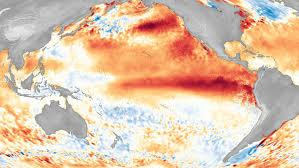
Southern Africa: Worst food crisis in decades worsened by El Niño
The situation is critical in Southern Africa, where the United Nations is warning of a food crisis of unprecedented severity. According to estimates, millions of people are threatened by hunger, a direct consequence of the intensification of the El Niño climate phenomenon. This situation is plunging the region into a socio-economic turmoil that could affect entire generations if urgent measures are not taken.
El Niño: worsening climatic conditions in southern Africa
The El Niño phenomenon, which results in abnormal warming of the Pacific Ocean waters, is having a devastating impact on global weather patterns. In southern Africa, the effects are mainly manifested in prolonged droughts and episodes of erratic rainfall. Since the beginning of 2024, rainfall has been largely inadequate, severely affecting crops and livestock in countries such as South Africa, Zimbabwe, Zambia and Malawi.
Farmers, who rely primarily on rain-fed crops to feed their families and supply local markets, are bearing the brunt. With disastrous harvests, food stocks are rapidly dwindling, and prices of basic foods are soaring. In many rural areas, people are being forced to reduce their daily consumption, while others are facing catastrophic food shortages.
The impact of El Niño also extends to livestock, which is a vital source of livelihood for millions of people in southern Africa. The drought has dried up water points and pastures, leading to massive livestock deaths and impoverishment of rural communities. For many, losing their livestock means losing their only source of income and food security.
A looming humanitarian crisis
The United Nations estimates that this crisis could become one of the most serious ever recorded in the region. Experts are already speaking of an extremely alarming food security situation, affecting millions of people across the continent. According to the World Food Programme (WFP), nearly 20 million people are at risk of being seriously affected by the end of the year if the situation persists.
Children and pregnant women are particularly vulnerable to this famine. Child malnutrition rates have increased dramatically, with dire consequences for the health and development of young children. Local health centres, already underfunded and poorly equipped, are struggling to cope with the influx of patients suffering from acute malnutrition.
In response to the crisis, international humanitarian agencies are mobilizing to provide emergency assistance. WFP and other organizations are distributing food rations in the worst-affected areas, but these efforts remain insufficient given the scale of the disaster. In addition, transport and distribution infrastructure is often strained, delaying the delivery of humanitarian aid to remote areas.
The economic and social consequences
Beyond the immediate food crisis, the effects of El Niño have serious economic implications. Agriculture, a mainstay of the economy in many countries in the region, has been hit hard. Reduced harvests mean less income for farmers and increased pressure on governments to subsidize food. In countries already struggling with high debt and limited economic growth, this new pressure risks deepening poverty and leading to social crises.
Rising food prices are exacerbating social tensions, particularly in urban areas where the majority of residents rely on markets for their supplies. Protests against rising prices of bread and other basic necessities have already been reported in several cities in the region. If these price increases continue, the risk of social unrest could intensify.
Governments in the region, although alerted for months to the seriousness of the situation, are struggling to respond effectively. The majority of southern African states are facing massive budget deficits, which limits their ability to finance relief programs and stabilize food markets.
The appeal to the international community
In this context, calls for international assistance are increasing. Humanitarian organizations are stressing the need for rapid intervention to prevent a large-scale humanitarian catastrophe. The international community is being called upon to step up its support, both in terms of emergency food aid and funding for longer-term projects.
Experts also warn of the long-term effects of this crisis. Southern Africa’s already fragile countries could be plunged into a cycle of poverty and aid dependency if sustainable solutions are not found. Priorities include investing in irrigation infrastructure, water storage systems and seeds that are resistant to extreme weather conditions. These measures would help strengthen communities’ resilience to future climate shocks.



Leave a comment
This site is protected by hCaptcha and the hCaptcha Privacy Policy and Terms of Service apply.